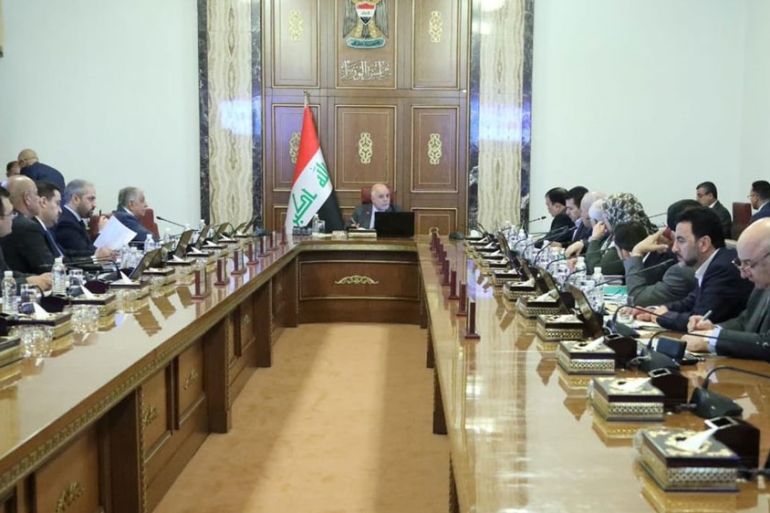Iraq’s Abadi to send team to US in hope of Iran transactions deal
PM says his country is unable to enact full sanctions against Iran, citing need for essential commodities.

Iraqi Prime Minister Haider al-Abadi plans to send a delegation to the United States to review Baghdad’s obligations towards sanctions against Tehran after President Donald Trump pulled out of the Iran deal in May.
Abadi said he will seek exemptions to deal with Iran for necessary commodities for the sustenance of Iraq.
“We have requests for the American side … and a delegation will go to negotiate within that framework,” he said, without specifying the trip’s date.
“We have presented a clear vision of what Iraq really needs. This includes Iranian [natural] gas, which is very important, as well as other trade and the electricity sector.”
In May, Trump announced the US’ withdrawal from the 2015 Iran nuclear deal, despite the best efforts of his European allies to convince him otherwise.
The first phase of reimposed sanctions took effect on August 7, with multinationals such as French energy giant Total and Danish shipping conglomerate Maersk exiting the Iranian market.
Analysts, however, say the situation in Iraq – where Tehran has contributed logistic support and military guidance in the fight against the Islamic State of Iraq and the Levant (ISIL, also known as ISIS) – is less clear.
“I think the Iraqi authorities are in a very delicate position, taking into consideration the influence of Iran in Iraq from one side and the need for the US to help maintain and improve security and the running of the country in a post-ISIS era,” Ali Bakeer, a political analyst, told Al Jazeera.
“From the US perspective also, Baghdad is very important because if it does not fully abide by US sanctions, it could turn into a main gate for Tehran to bypass the sanctions scheme.”
Delicate balancing act
Earlier this month, Abadi said while Iraq disagreed with US sanctions on Iran, it would ultimately have to abide by them “to protect the interest of our people”.
According to a report by The Associated Press, Iran cancelled a scheduled trip by Abadi to Tehran on August 12.
The next day, Abadi – who is leading a fragile caretaker government until a new one is formed later this year – seemed to walk back his commitment on US sanctions when he said he only agreed to not use dollars in transactions with Iran.
“I did not say we abide by the sanctions, I said we abide by not using dollars in transactions. We have no other choice,” he told reporters.
Giorgio Cafiero, a political analyst and CEO of risk consultancy Gulf State Analytics, told Al Jazeera regardless of whether Iraqi officials succeed in convincing their counterparts in Washington, the effect of sanctions on Iran is already being felt.
“Iraqi investors in Iran have already suffered major losses and Iraq’s religious tourism industry, which represents almost all of Iraq’s entire tourism sector, is hurting too as fewer Iranians can afford to make visits to shrines in Karbala, Najab, Samarra, and Baghdad due to inflation,” Cafiero said.
The result of a general election in May showed the Shia leader Muqtada al-Sadr’s joint list on top with 54 seats out of 329 in parliament, followed in close second by the Iran-affiliated al-Fatih alliance with 48.
Abadi‘s al-Nasr bloc came in third with 42 seats.
With no party or bloc able to secure an outright majority in the May 12 vote, negotiations between the different political actors are ongoing.
The winning parties still haven’t settled on a wide array of issues, ranging from US and Iranian influence on government to the reintegration of armed groups – known as the Popular Mobilisation Forces (PMF) – into the formal security apparatus.